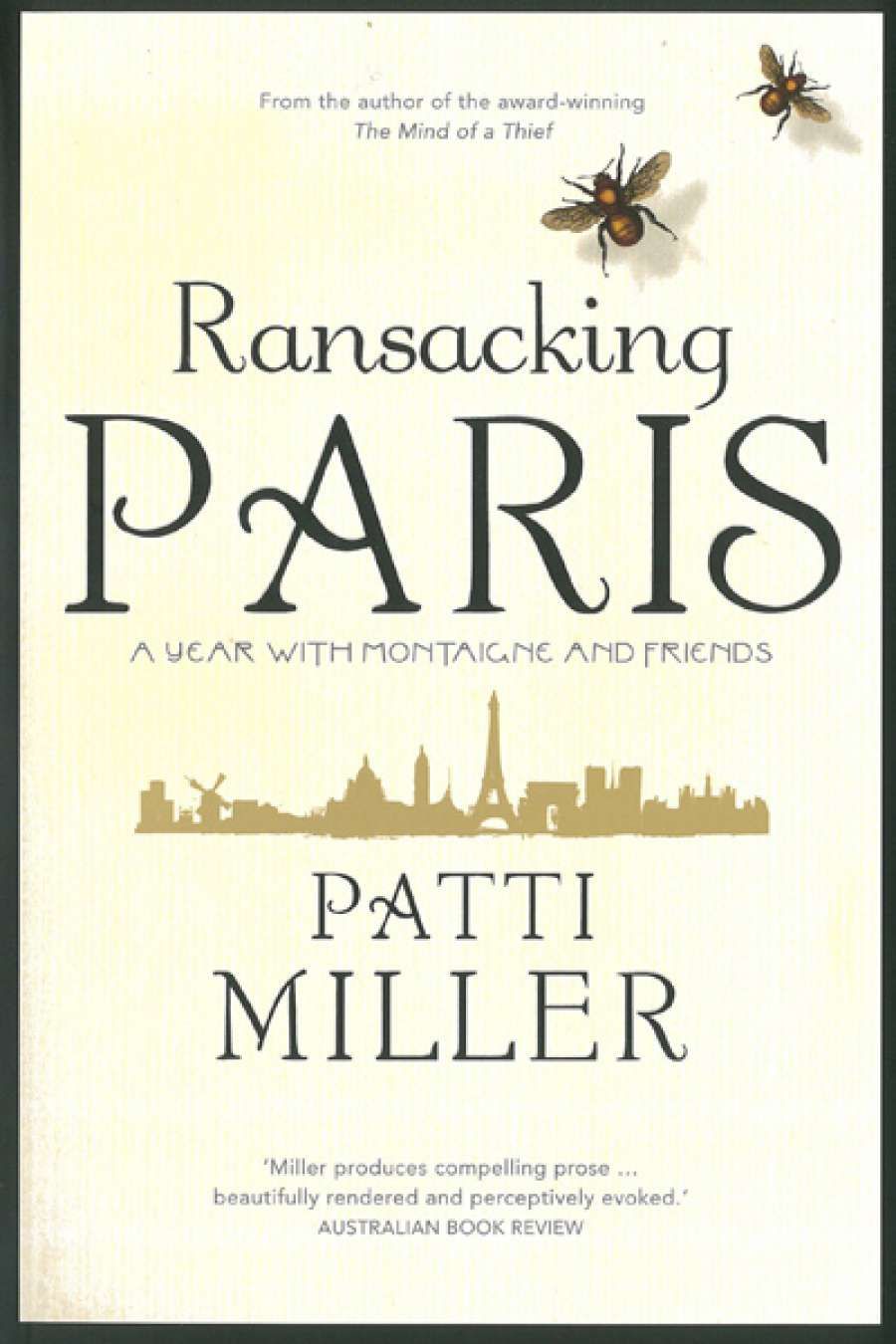
- Free Article: No
- Contents Category: Memoir
- Custom Article Title: Judith Armstrong reviews 'Ransacking Paris' by Patti Miller
- Review Article: Yes
- Online Only: No
- Book 1 Title: Ransacking Paris
- Book 1 Subtitle: A year with Montaigne and friends
- Book 1 Biblio: University of Queensland Press, $29.95 pb, 274 pp, 9780702253393
As befits the genre, the ordering of Miller’s memoir is basically chronological, proceeding month by month from July to June the following year. But she has superimposed on it another, more episodic, five-part structure which distantly recalls the form of French classical drama but ends up significantly more formulaic than the comedies of Molière.
Putting into practice the advice she offers her students (‘Start with something simple and familiar’), she conjures up, in her fifth-floor, walk-up Montparnasse flat, a childhood memory, some treasured aspect of her happy existence as a middling child among several siblings brought up by loving parents on a farm in New South Wales. This constitutes Act I. The rural recollections are well done, resulting in a vivid picture of farm life half a century ago, but they are also made to serve as windows to Miller’s French themes. The absence of running water in the farmhouse, and hence the lack of daily baths, lead to Stendhal’s confession about proximity to ‘the people’: ‘It would be a constant torment for me to live with the people’ because ‘the people are always dirty’, she quotes.
Having manoeuvred her French writer centre-stage, Miller freezes him or her while she asks, ‘What needs to be known about Montaigne (or Mme de Sévigny, or Simone de Beauvoir)?’ There follows a potted biography: ‘Let’s see: his dates are 1533–1592; he lived in a chateau [sic] in the Périgord ...’
It is hard not to dismiss these morsels of information as banal or gratuitous or both, especially when followed by similar make-weights in Act IV: ‘What else needs to be said about ...?’ Mostly an engaging writer, Miller seems unaware of the patronising note she frequently adopts in these sections (e.g. explaining what a palimpsest is), and of the confiding tone that can descend into chumminess: irritated by Proust’s ‘sickliness’, she finds ‘interminable’ the pages where the narrator (whom she ‘can’t help thinking is Proust himself’ – ‘a sensitive type’) is waiting for his mother to ‘say’ (importantly, the original has her ‘kiss’ him) good night. ‘Just get on with it, for heaven’s sake,’ she exclaims.
‘When the writer is honest, modest, and disarming, what’s not to like?’
This reviewer’s irritation at being talked down to is exacerbated by Miller’s habit of reminding us that she is in Paris by quoting in French examples of conversation and signage, reassuringly followed by her own translations (nearly always correct). I admit that the conversational use of foreign languages can be a problem in all but academic circles, where it used to be customary to provide translations (as footnotes) for all languages except French, which was assumed to be known to educated readers; but these days most writerswanting to signpost a foreign flavour avoid interrupting the flow by using the original language once only, to make the point, before reverting to monolingual English.
‘This memoir wears not only its heart, but its author on its sleeve’
Miller has read her chosen writers assiduously (all in translation, except for the contemporary Annie Ernaux), and carefully lays before us her considered reactions to them (these constitute Act III). Act V is less of a resolution and more of a climax to the drama. Miller selects a café, dresses carefully, and goes to ‘meet’ each memoirist in person, before returning to her laptop to record the conversation. Perhaps she is channelling the encounters of the struggling writer Gil Pender with Hemingway and Stein in Woody Allen’s film Midnight in Paris (2011). There it seemed an amusing device; here the artless conjuring is less successful.
Ransacking Paris is a book that, more than most, invites speculation about its intended audience. My view is that it might have constituted a more interesting experiment had it been classified as a work for young adults – not a category normally associated with memoir. As it stands, the sincerity and approachability of Ransacking Paris will no doubt find a wide and appreciative audience, but individuals well acquainted with Paris or French Language and Literature should consider their options.


Comments powered by CComment